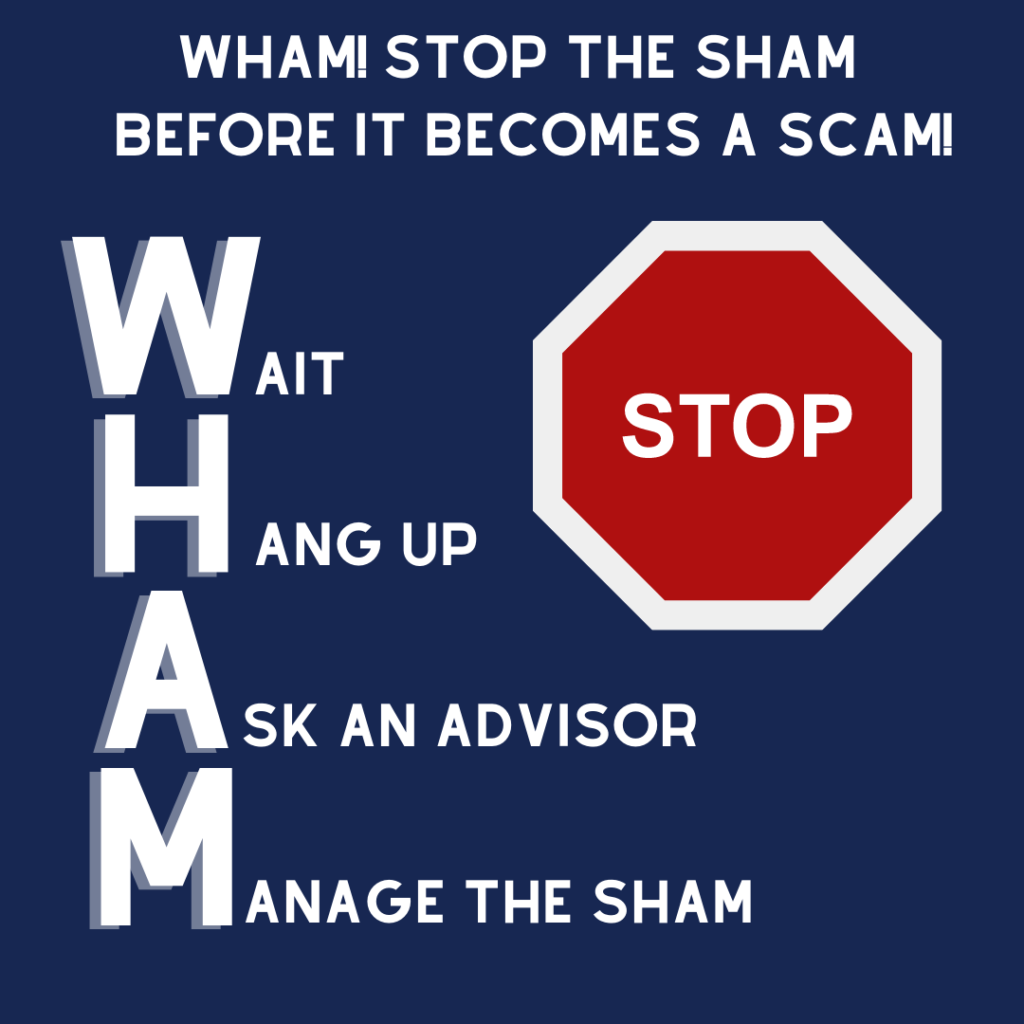
“WHAM! Stop the Sham Before It Becomes A Scam!” W.H.A.M. is an acronym used by OISS to help students respond to potential scams. W – Wait, H – Hang up the Phone, A – Ask an OISS Advisor, and M – Manage the Sham.
October 16, 2020
Written By: Lara Jennings, International Student & Scholar Advisor
Unfortunately, international students are especially vulnerable to scammers because they use your immigration status and lack of knowledge of U.S. systems to scare you into complying with their demands. Each year OISS does our best to help students be aware of new potential scams as well as using the W.H.A.M. approach to “stop the sham before it becomes a scam”.
As we near the cusp of Midterms, let’s see if you can pass our scam quiz!
Q1: An ICE Agent calls you and confirms your F-1 status, your full name and the school you attend. The agent then begins to ask you questions about your personal information. In this case you should:
A. Answer the Agents questions and comply with the directions they tell you.
B. Ask for the agent’s name, employee ID and then answer their questions.
C. Do not answer any of the agent’s questions, ICE will never call you.
Q2: I got a call from a guy named Ben, who said he was calling from the Immigration Service about missing information on my OPT application. I was really concerned because he knew my name, where I worked, and that I was applying for OPT. He told me I was in violation of policies by not providing the missing information and needed to go to a website right away to complete the missing information. Am I being scammed?
A. No, because how else would he know you applied for OPT?
B. No, the agent told you his name and is trying to prevent a violation from happening.
C. Yes, this is a scam because the government will never demand you to go instantly to a website over the phone.
Q3: The IRS (Internal Revenue Service) called and left you a voice message to call back as soon as possible because they detected fraud on your last year’s taxes. When you called the agent back the caller ID popped up with the name “IRS”. The agent answered and gave you their Employee ID number and then told you, you need to get gift cards to make an immediate payment to them or else they would send a cop to your house to have you arrested for tax fraud. In this case you should:
A. Stay on the phone with them until you buy the gift cards and give them the information to transfer the money to them so you do not get arrested.
B. Verify information such as your date of birth and your zip code so they can start clearing the fraud from your record.
C. Not call back a number on a suspicious voice message because there are many computers/apps that can create a fake number/caller ID name.
How do you think you did? These three scenarios are all based on recent scams that have affected our students. It might seem like it would be easy to catch a scammer at work. However, scammers are skillful individuals who have perfected the art of manipulating and scaring people into doing something that makes no sense (like buying gift cards, giving your bank information, or sending money somewhere).
Check the answer key for the correct answers along with further explanation about these scenarios and how other WashU students handle these kinds of calls. (While calls are the most frequent form of scams, please also be aware that phone calls are not the only means a scammer will use).
Quiz Answer Key:
A1: The correct answer is C. ICE will never call you. In fact, it is unlikely that any government agency such as Department of Homeland Security, USCIS, Department of State, etc. would try to call you. It is important to never share your personal information over the phone or internet to anyone that you are unsure of their identity (i.e. a random caller). This case is based off of a real call that happened to a student this year who was able to identify this caller as a scam. The student did the right thing to not give out any personal information and reported the scam to WUPD and OISS.
A2: The correct answer is C. As you can imagine, this student picked up right away that this call was a scam. First, the student realized that “Ben” kept the pressure on and made everything seem very urgent. This sense of urgency is one of the biggest signs that a scammer is at work. The U.S. government will never make demands such as going to a website over the phone. If they want to request information from you, this will nearly 100% of the time be done through official communications (i.e. U.S. mail) with a designated amount of time to respond by. The student told the scammer that their internet was broken and they hung up and reported to WUPD and OISS. This student did the right thing.
A3: The correct answer is C. Never call back a phone number from a suspicious caller. It is better to search for the publicly published phone number such as in this case, calling the IRS directly back. If someone called you from the IRS they would know and will even be able to help you know if it was a potential scam or not. Unfortunately every year we have students who end up purchasing gift cards or sending a check to a scammer. Many times students are made to feel the situation is urgent and they cannot get off the phone or they will be in trouble. This situation can be extremely scary and happen to anyone.